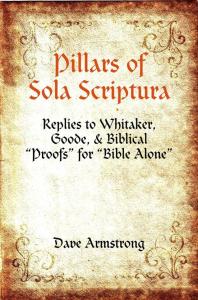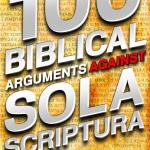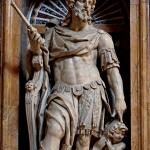[book and purchase information]
Martin Luther (1483-1546)
This is my answer to those also who accuse me of rejecting all the holy teachers of the church. I do not reject them. But everyone, indeed, knows that at times they have erred, as men will; therefore, I am ready to trust them only when they give me evidence for their opinions from Scripture, which has never erred. This St. Paul bids me to do in I Thess. 5:21, where he says, “Test everything; hold fast what is good.” . . .
[N]ecessity forces us to run to the Bible with the writings of all teachers, and to obtain there a verdict and judgment upon them. Scripture alone is the true lord and master of all writings and doctrine on earth. If that is not granted, what is Scripture good for? The more we reject it, the more we become satisfied with men’s books and human teachers. (Defense and Explanation of All the Articles of Dr. Martin Luther Which Were Unjustly Condemned by the Roman Bull [March 1521], in Luther’s Works [LW], Vol. 32: Career of the Reformer II, ed. Jaroslav Jan Pelikan, Hilton C. Oswald, and Helmut T. Lehmann, vol. 32, Philadelphia: Fortress Press, 1999, 11–12 [see secondary source])
[W]e have an agreement that we are willing to fight each other, not by appealing to the authority of any doctor, but by that of Scripture alone. (On the Bondage of the Will, 1525, in LW, Vol. 33, 167 [see secondary source])
John Calvin (1509-1564)
First we affirm that we desire to follow Scripture alone as rule of faith and religion, without mixing with it any other thing which might be devised by the opinion of men apart from the Word of God, and without wishing to accept for our spiritual government any other doctrine than what is conveyed to us by the same Word without addition or diminution, according to the command of our Lord. (Instruction and Confession, 1537, in J. K. S. Reid, Calvin: Theological Treatises, Louisville, Kentucky; London: Westminster John Knox Press, 1954, 26 [see secondary source])
Here I implore the pious, I entreat that they might know the true rule of righteousness from Scripture alone, that they might judge religiously and seriously as Scripture itself judges it, . . . (Institutes of the Christian Religion, 10.68, edition of 1539; in Corpus Reformatorum [CR], 29.785 [see secondary source])
In regard to Traditions, I am aware that not unfrequent mention of them is made by ancient writers, though not with the intention of carrying our faith beyond the Scriptures, to which they always confine it. They only say that certain customs were received from the Apostles. Some of them appear to have that origin, but others are unworthy of it. These touch only upon a few points, and such as might be tolerated. But now we are called to believe, that whatever the Romanists are pleased to obtrude upon us, flowed by tradition from the Apostles; and so shameless are they, that without observing any distinction, they bring into this class things which crept in not long ago, during the darkness of ignorance. Therefore, though we grant that the Apostles of the Lord handed down to posterity some customs which they never committed to writing; still, first, this has nothing to do with the doctrine of faith, (as to it we cannot extract one iota from them,) but only with external rites subservient to decency or discipline; and secondly, it is still necessary for them to prove that everything to which they give the name is truly an apostolical tradition. . . . We especially repudiate their desire to make certainty of doctrine depend not less on what they call αγραφα, (unwritten,) than on the Scriptures. (Antidote to the Council of Trent, 1547, in Tracts Relating to the Reformation, vol. 3, trans. H. Beveridge, Edinburgh: Calvin Translation Society, 1851, 69 [see secondary source])
Belgic Confession (1561)
7: The Sufficiency of the Holy Scriptures to Be the Only Rule of Faith
We believe that those Holy Scriptures fully contain the will of God, and that whatsoever man ought to believe unto salvation is sufficiently taught therein. For, since the whole manner of worship which God requires of us is written in them at large, it is unlawful for any one, though an apostle, to teach otherwise than we are now taught in the Holy Scriptures; nay, though it were an angel from heaven, as the apostle Paul saith. For, since it is forbidden to add unto or take away any thing from the Word of God, it doth thereby evidently appear that the doctrine thereof is most perfect and complete in all respects.
Neither do we consider of equal value any writing of men, however holy these men may have been, with those divine Scriptures, nor ought we to consider custom, or the great multitude, or antiquity, or succession of times and persons, or councils, decrees, or statutes, as of equal value with the truth of God, for the truth is above all; for all men are of themselves liars and more vain than vanity itself. Therefore we reject with all our hearts whatsoever doth not agree with this infallible rule, which the apostles have taught us, saying, Try the spirits whether they are of God. Likewise, if there come any unto you, and bring not this doctrine, receive him not into your house. (source)
Second Helvetic Confession (1564)
But we hold that the interpretation of the Scripture to be orthodox and genuine which is gleaned from the Scriptures themselves . . .
Wherefore we do not despise the interpretations of the holy Greek and Latin fathers, nor reject their disputations and treatises concerning sacred matters as far as they agree with the Scriptures; but we modestly dissent from them when they are found to set down things differing from, or altogether contrary to, the Scriptures. . . .
Wherefore we do not permit ourselves, in controversies about religion or matters of faith, to urge our case with only the opinions of the fathers or decrees of councils; much less by received customs, or by the large number of those who share the same opinion, or by the prescription of a long time. Who Is The Judge? Therefore, we do not admit any other judge than God himself, who proclaims by the Holy Scriptures what is true, what is false, what is to be followed, or what to be avoided. . . .
Likewise we reject human traditions, even if they be adorned with high-sounding titles, as though they were divine and apostolical, delivered to the Church by the living voice of the apostles, and, as it were, through the hands of apostolical men to succeeding bishops which, when compared with the Scriptures, disagree with them; and by their disagreement show that they are not Apostolic at all. (Chapter Two) [source]
Thirty-Nine Articles (Anglicanism, 1571)
Of the sufficiency of the Holy Scripture for Salvation
Holy Scripture containeth all things necessary to salvation: so that whatsoever is not read therein, nor may be proved thereby, is not to be required of any man, that it should be believed as an article of the faith, or be thought requisite or necessary to salvation. (Article VI)
Lutheran Confession[s] (1577)
We believe, teach, and confess that the sole rule and standard according to which all dogmas together with [all] teachers should be estimated and judged are the prophetic and apostolic Scriptures of the Old and of the New Testament alone, as it is written Ps. 119:105: Thy Word is a lamp unto my feet and a light unto my path. And St. Paul: Though an angel from heaven preach any other gospel unto you, let him be accursed, Gal. 1:8. (, 1 [written in 1577 by a number of Lutheran theologians, including Jakob Andreä (1528–90), Martin Chemnitz (1522–86), and Andreas Musculus (1514–81)] )
William Whitaker (1548-1595), Calvinist Anglican, Disputation on Holy Scripture: Against the Papists, Especially Bellarmine and Stapleton (1588)
We do not, therefore, as the papists falsely say of us, refuse the testimony of the church, but embrace it. But we deny that we believe the scriptures solely on account of this commendation of them by the church. For we say that there is a more certain and illustrious testimony, whereby we are persuaded of the sacred character of these books, that is to say, the internal testimony of the Holy Spirit, without which the commendation of the church would have with us no weight or moment. The papists, therefore, are unjust to us, when they affirm that we reject and make no account of the authority of the church. For we gladly receive the testimony of the church, and admit its authority; but we affirm that there is a far different, more certain, true, and august testimony than that of the church. The sum of our opinion is, that the scripture . . . hath all its authority and credit from itself; is to be acknowledged, is to be received, not only because the church hath so determined and commanded, but because it comes from God; and that we certainly know that it comes from God, not by the church, but by the Holy Ghost. (pp. 279-280) [primary source]
Westminster Confession (1646)
VI. The whole counsel of God, concerning all things necessary for his own glory, man’s salvation, faith, and life, is either expressly set down in Scripture, or by good and necessary consequence may be deduced from Scripture: unto which nothing at any time is to be added, whether by new revelations of the Spirit, or traditions of men. . . .
IX. The infallible rule of interpretation of Scripture is the Scripture itself; and therefore, when there is a question about the true and full sense of any Scripture (which is not manifold, but one), it must be searched and known by other places that speak more clearly.
X. The Supreme Judge, by which all controversies of religion are to be determined, and all decrees of councils, opinions of ancient writers, doctrines of men, and private spirits, are to be examined, and in whose sentence we are to rest, can be no other but the Holy Spirit speaking in the Scripture. (Chapter One) [source]
William Goode (1801-1868), evangelical Anglican, The Divine Rule of Faith and Practice (2nd ed., three volumes, 1853)
[T]here is nothing of which we have sufficient evidence that it is Divine or inspired testimony but the Holy Scripture; and consequently that the Holy Scripture is our sole and exclusive Divine Rule of faith and practice. (Vol. 1, p. 21)
Let us observe the arguments and objections derived from Scripture itself on this point. . . . Now, here I admit at once, that there is no passage of the New Testament precisely stating, that the Christian Rule of faith is limited to the Scriptures of the Old and New Testament; . . . (Vol. 1, p. 70; italics added)
But though we have not, and were not likely to have, such an announcement in Scripture, we have there what may answer as well, the determination of a parallel case, viz., that of the Jews at the time of our Lord’s incarnation. We learn clearly from Scripture, that the Canon of the Old Testament was to them at that time (the divine voice being no longer heard among them) the sole Rule of faith; and that the traditions of the Fathers, notwithstanding their pretended divine origin, were not worthy of being considered the Word of God. . . . That the Scriptures of the Old Testament were to the Jews of that period the sole authoritative Rule of faith, we have, I conceive, very sufficient testimony in Scripture. (Vol. 1, p. 71)
[T]here is no direct testimony in the Old Testament to its perfection as the sole infallible Rule of faith to the Jews in the time of our Lord, . . . (Vol. 1, p. 73; italics added) [primary sources: Vol. 1 / Vol. 2]
Modern Day Reiterations (1995-2001)
What Protestants mean by sola scriptura is that the Bible alone is the infallible written authority for faith and morals. (Evangelical Protestant apologist Norman Geisler: Roman Catholics and Evangelicals: Agreements and Differences, Grand Rapids, Michigan: Baker Books, 1995, 178; co-author, Ralph E. Mackenzie)
The doctrine of sola scriptura, simply stated, is that the Scriptures alone are sufficient to function as the regula fidei, the infallible rule of faith for the Church. (Reformed Baptist apologist James R. White: The Roman Catholic Controversy, Minneapolis: Bethany House Publishers, 1996, 59)
Scripture . . . is the only inspired and inherently infallible norm, and therefore Scripture is the only final authoritative norm. (Reformed Protestant Keith A. Mathison: The Shape of Sola Scriptura, Moscow, Idaho: Canon Press, 2001, 260)
Related Reading
My Bible, Tradition, Canon, & Sola Scriptura web page
Papal Infallibility Doctrine: History (Including Luther’s Dissent at the Leipzig Disputation in 1519) (Related also to the particular circumstances of the origins of sola Scriptura) [10-8-07]
100 Biblical Arguments Against Sola Scriptura [Book: May 2012]
Pillars of Sola Scriptura: Replies to Whitaker, Goode, & Biblical ‘Proofs’ for ‘Bible Alone’ [Book: 9-2-12]
The Bible Tells Me So: A Catholic Apologist Challenges Protestants with Scripture [Book: Jan. 2019]
***
Practical Matters: Perhaps some of my 3,900+ free online articles (the most comprehensive “one-stop” Catholic apologetics site) or fifty books have helped you (by God’s grace) to decide to become Catholic or to return to the Church, or better understand some doctrines and why we believe them.
*
Or you may believe my work is worthy to support for the purpose of apologetics and evangelism in general. If so, please seriously consider a much-needed financial contribution. I’m always in need of more funds: especially monthly support. “The laborer is worthy of his wages” (1 Tim 5:18, NKJV). 1 December 2021 was my 20th anniversary as a full-time Catholic apologist, and February 2022 marked the 25th anniversary of my blog.
*
PayPal donations are the easiest: just send to my email address: [email protected]. You’ll see the term “Catholic Used Book Service”, which is my old side-business. To learn about the different methods of contributing, including 100% tax deduction, etc., see my page: About Catholic Apologist Dave Armstrong / Donation Information. Thanks a million from the bottom of my heart!
***
Summary: I offer twelve sources: authoritative Protestant definitions of sola Scriptura: the notion that the Bible is the sole infallible norm and source of Christian doctrine and faith.
***














